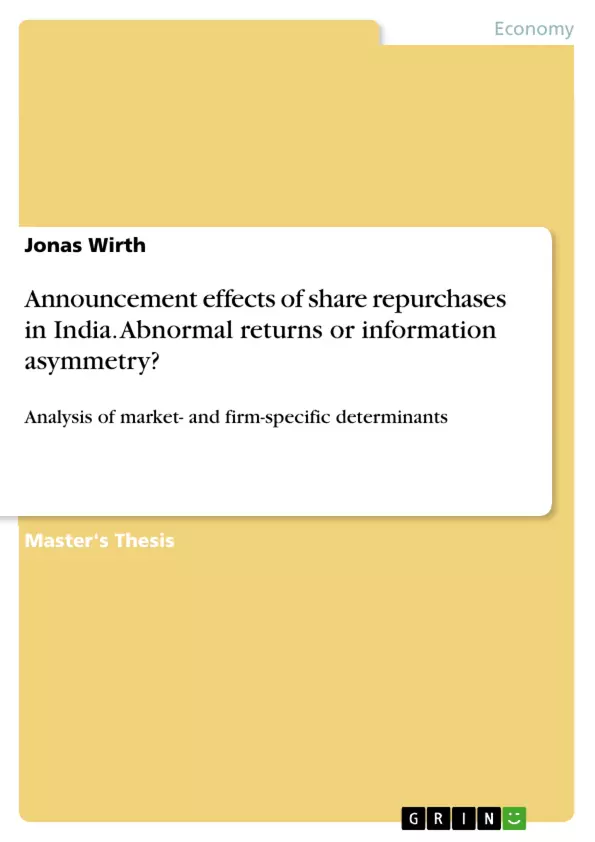In this paper, market-based and firm-specific determinants are introduced to measure their association with abnormal returns around the announcement of a share buyback conducted through tender and open market offers in India. To test the valuation effect of market-based variables: uncertainty, which is determined by implied market volatility and economic policy uncertainty. Liquidity risk, which is investigated through two illiquidity proxies and the impact of the monetary environment, represented by the three-month Mumbai Interbank Offer Rate (MIBOR) and the gold price are included. In addition, the main firm-specific hypotheses are tested to identify potential key drivers.
The valuation effects examined cover the period from April 1, 2011, to March 31, 2021, during which a total of 359 share repurchases were made, 231 through tender offer and the remaining 128 through the open market. Beside separating the two buyback methods, I examine different categories in addition to the full sample to determine whether market participants' reaction to share repurchase announcements leads to abnormal returns.
The rest of the paper is organized as follows. Next section provides an overview about the regulatory framework of share buyback in India. Section 3 states a brief overview about the share repurchase literature with reference to uncertainty and liquidity in global context and firm-specific literature in Indian context. Then the hypotheses are stated. Sections 5 and 6 present the methodology and data, and section 7 presents the empirical results. Section 8 provides concluding remarks.
Inhaltsverzeichnis (Table of Contents)
- 1 Introduction
- 2 Law of Regulations
- 3 Literature Review
- 3.1 Market-based
- 3.2 Firm-specific
- 4 Hypotheses
- 4.1 Firm-specific
- 4.2 Market-based
- 5 Methodology
- 5.1 Calculating abnormal returns
- 5.2 Liquidity measures
- 5.3 Regressions
- 6 Data
- 6.1 Share repurchase announcements
- 6.2 Data selection
- 7 Empirical Analysis
- 7.1 Abnormal returns
- 7.2 Market-based and firm-specific regressions
- 7.3 Robustness
Zielsetzung und Themenschwerpunkte (Objectives and Key Themes)
This master thesis explores the impact of share repurchase announcements on stock prices in India. The primary objective is to examine whether such announcements result in abnormal returns, indicating market reactions to new information, or reflect information asymmetry. The study investigates both market-based and firm-specific determinants of abnormal returns, analyzing a comprehensive dataset of share repurchase announcements in India.
- Announcement Effects of Share Repurchases
- Information Asymmetry and Market Reactions
- Market-Based Determinants of Abnormal Returns
- Firm-Specific Determinants of Abnormal Returns
- Analysis of Abnormal Returns in the Indian Context
Zusammenfassung der Kapitel (Chapter Summaries)
- Chapter 1: Introduction This chapter provides a brief overview of the research topic and the importance of share repurchases in corporate finance. It highlights the specific research question and the overall objectives of the study, emphasizing the relevance of the Indian market context.
- Chapter 2: Law of Regulations This chapter examines the legal framework governing share repurchases in India. It discusses relevant regulations, procedures, and guidelines outlined by the Securities and Exchange Board of India (SEBI), providing a foundation for understanding the legal context surrounding share repurchases.
- Chapter 3: Literature Review This chapter reviews existing literature on the impact of share repurchases on stock prices, focusing on both market-based and firm-specific determinants. It analyzes various theoretical frameworks and empirical studies from global markets to provide a comprehensive overview of the current research landscape.
- Chapter 4: Hypotheses This chapter develops specific hypotheses based on the reviewed literature. It proposes relationships between key market-based and firm-specific variables and the magnitude of abnormal returns associated with share repurchase announcements.
- Chapter 5: Methodology This chapter outlines the methodology employed in the study. It details the event study approach used to calculate abnormal returns, explains the liquidity measures employed, and discusses the regression models used to test the hypotheses.
- Chapter 6: Data This chapter provides a detailed description of the data used in the analysis. It outlines the process of collecting and selecting data on share repurchase announcements, highlighting the specific criteria used to construct the sample.
- Chapter 7: Empirical Analysis This chapter presents the empirical results of the study. It analyzes the abnormal returns associated with share repurchase announcements, examines the relationships between market-based and firm-specific variables, and performs robustness tests to ensure the reliability of the findings.
Schlüsselwörter (Keywords)
The study focuses on the announcement effects of share repurchases in the Indian market, examining abnormal returns, information asymmetry, market-based determinants, firm-specific determinants, event study methodology, and regression analysis. The research aims to contribute to the understanding of the impact of share repurchases on stock prices within a specific emerging market context.
Frequently Asked Questions
What is the impact of share repurchase announcements on stock prices in India?
The study examines whether buyback announcements lead to abnormal returns, analyzing both tender offers and open market offers in the Indian market context.
What are the main determinants of abnormal returns during a buyback?
The research distinguishes between market-based factors (like volatility and liquidity risk) and firm-specific factors to identify what drives stock price reactions.
How does the Indian regulatory framework for buybacks work?
Share repurchases in India are governed by the Securities and Exchange Board of India (SEBI) guidelines, which regulate the methods and procedures for companies.
What is the difference between a tender offer and an open market offer?
A tender offer is a direct offer to shareholders to buy back shares at a specific price, while an open market offer involves the company buying shares through the stock exchange.
What is information asymmetry in the context of share buybacks?
It refers to the situation where company management has more information about the firm's true value than outside investors, often using buybacks as a signal of undervaluation.
- Citar trabajo
- Jonas Wirth (Autor), 2022, Announcement effects of share repurchases in India. Abnormal returns or information asymmetry?, Múnich, GRIN Verlag, https://www.grin.com/document/1361500



